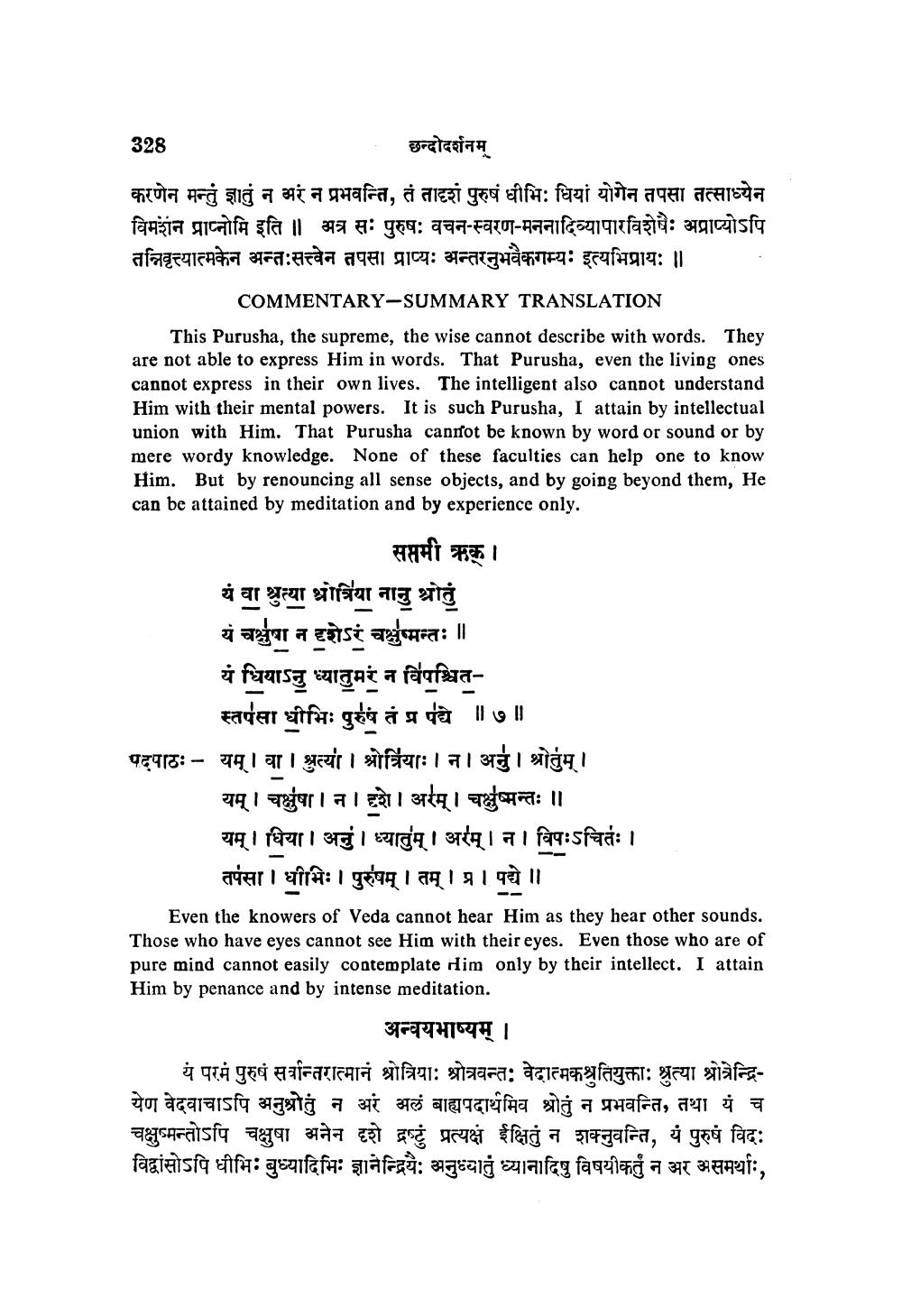________________
328
छन्दोदर्शनम् करणेन मन्तुं ज्ञातुं न अरं न प्रभवन्ति, तं तादृशं पुरुषं धीभिः धियां योगेन तपसा तत्साध्येन विमशन प्राप्नोमि इति ॥ अत्र सः पुरुषः वचन-स्वरण-मननादिव्यापारविशेषैः अप्राप्योऽपि तन्निवृत्त्यात्मकेन अन्तःसत्त्वेन तपसा प्राप्यः अन्तरनुभवैकगम्यः इत्यभिप्रायः ॥
COMMENTARY-SUMMARY TRANSLATION This Purusha, the supreme, the wise cannot describe with words. They are not able to express Him in words. That Purusha, even the living ones cannot express in their own lives. The intelligent also cannot understand Him with their mental powers. It is such Purusha, I attain by intellectual union with Him. That Purusha cannot be known by word or sound or by mere wordy knowledge. None of these faculties can help one to know Him. But by renouncing all sense objects, and by going beyond them, He can be attained by meditation and by experience only.
सप्तमी ऋक् । यं वा श्रुत्या श्रोत्रिया नानु श्रोतुं यं चक्षुषा न दृशेऽरं चक्षुष्मन्तः ॥ यं धियाऽनु ध्यातुमरं न विपश्चित
स्तपसा धीभिः पुरुष तं प्रपद्ये ॥ ७ ॥ पदपाठः – यम् । वा । श्रुत्या । श्रोत्रियाः । न । अनु । श्रोतुम् ।
यम् । चक्षुषा । न । दृशे । अरम् । चक्षुष्मन्तः । यम् । धिया। अनुं । ध्यातुम् । अरम् । न । विपःऽचितः।
तप॑सा । धीभिः । पुरुषम् । तम् । प्र । पद्ये ॥ Even the knowers of Veda cannot hear Him as they hear other sounds. Those who have eyes cannot see Him with their eyes. Even those who are of pure mind cannot easily contemplate Him only by their intellect. I attain Him by penance and by intense meditation.
अन्वयभाष्यम् । यं परमं पुरुष सर्वान्तरात्मानं श्रोत्रियाः श्रोत्रवन्त: वेदात्मकश्रुतियुक्ताः श्रुत्या श्रोत्रेन्द्रियेण वेदवाचाऽपि अनुश्रोतुं न अरं अलं बाह्यपदार्थमिव श्रोतुं न प्रभवन्ति, तथा यं च चक्षुष्मन्तोऽपि चक्षुषा अनेन दृशे द्रष्टुं प्रत्यक्षं ईक्षितुं न शक्नुवन्ति, यं पुरुषं विदः विद्वांसोऽपि धीभिः बुध्यादिभिः ज्ञानेन्द्रियैः अनुध्यातुं ध्यानादिषु विषयीकर्तुं न अर असमर्थाः,




